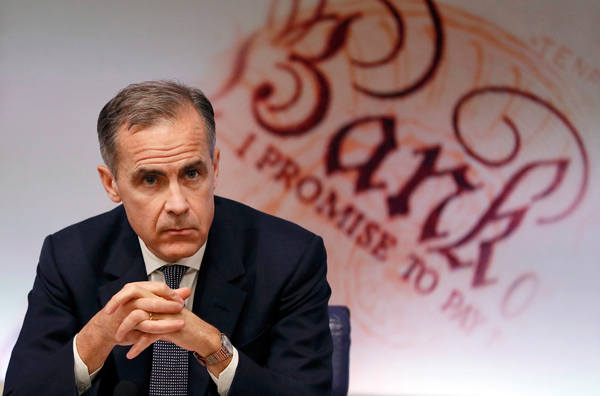Bank of England revises up UK growth forecasts
LONDON — The Bank of England on Thursday revised up its growth forecasts for the British economy for the coming three years but cautioned about the inflation outlook in the wake of the pound's sharp decline since the country's vote to leave the European Union.
|
 |
|
Mark Carney, Governor of the Bank of England attends the quarterly Inflation Report press conference at the bank in London, Britain February 2, 2017.??[Photo/Agencies] |
The bank also kept its main interest rate at the record low of 0.25 percent, a decision that was widely anticipated given Britain's economy has performed stronger than many forecasters predicted in the aftermath of last June's Brexit vote. In the fourth quarter of 2016, it expanded at a quarterly rate of 0.6 percent — making it one of the strongest performing major economies in the world.
"The Brexit journey is really just beginning," Bank of England Governor Mark Carney said in his opening remarks. "While the direction of travel is clear, there will be twists and turns along the way."In its quarterly economic projections, also published Thursday, the bank increased its growth forecasts for the next three years.
In the Inflation Report, the bank increased its growth forecast for this year to 2 percent, 1.6 percent in 2018 and 1.7 percent in 2019. Those are up from November's predictions for 1.4 percent growth in 2017, 1.5 percent in 2018 and 1.6 percent in 2019.
The more positive tone from the central bank contrasts with the worries in the immediate aftermath of the Brexit vote, which had prompted in August the nine-member Monetary Policy Committee to cut rates for the first time in more than seven years and expand its economic stimulus program.
"Following the referendum, the Bank (took steps) to support households and businesses during a period of initial uncertainty and eventual adjustment to the country's new relationship with the EU," Carney said. "That stimulus is working."But the minutes to Thursday's meeting suggested that some policymakers may find it hard to justify keeping rates at their present levels despite "exceptional circumstances."
"There are limits to the extent that above-target inflation can be tolerated," the minutes said. "The continuing suitability of the current policy stance depends on the trade-off between above-target inflation and slack in the economy."Inflation has started rising in recent months and is expected to continue to do so this year as the fallout from the pound's slide impacts on prices — a lower pound makes imports such as oil more expensive.
"These concerns, however, clearly are not severe enough for any member to think higher rates are warranted immediately," said Samuel Tombs, chief UK economist at Pantheon Macroeconomics. "The core view at the Bank remains that domestically-generated inflation, especially wage growth, will remain too weak to justify raising rates over the next year, a view we share."

























